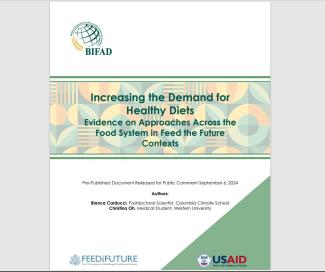BIFAD, a presidentially appointed seven-member advisory board to USAID, advises the USAID Administrator on global agriculture, nutrition, and food security. BIFAD's thought leadership and ability to convene the U.S. university and research communities, along with international partners, positions the Board to develop evidence-based recommendations on pertinent issues of global importance.
One of BIFAD’s current priorities is a focus on nutrition and, specifically, on the availability of safe and affordable nutritious foods. Optimal nutrition is crucial for achieving the USAID’s broader mission of ending extreme poverty, promoting resilient and democratic societies, and enhancing national security and prosperity. The USAID Multi-Sectoral Nutrition Strategy (2014–2025) and the U.S. government’s Global Food Security Strategy (2022–2026) have put forward agendas to elevate nutrition, food security, and food safety.
This draft evidence review, prepared for BIFAD, aims to present current evidence on effective policies and interventions that enhance the supply of nutritious and safe foods, including through micro-, small- and medium- sized enterprises within supply chains and markets and support consumer demand for healthier diets, including purchasing and consumption of healthy diets. Key inputs to the brief included a review of the peer-reviewed and grey literature and perspectives shared at an expert roundtable convened in July 2024. The report outlines preliminary findings from the available evidence, implications, and opportunities for future USAID programming aimed at increasing demand for healthy diets.
The draft findings and recommendations of this evidence review will be discussed at the BIFAD Public Meeting on Demand-Side Interventions and Approaches for Healthy Diets on Tuesday, September 17. The public is encouraged to provide any feedback or additional insight to inform this research by October 4, 2024 via the public comment form or by email to Clara Cohen, Designated Federal Officer for BIFAD in the Bureau for Resilience and Food Security at USAID, at ccohen@usaid.gov. All public comments will be included in the public record and considered in BIFAD’s final recommendations.

